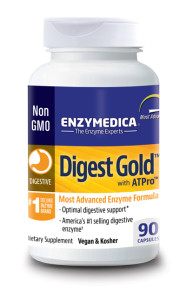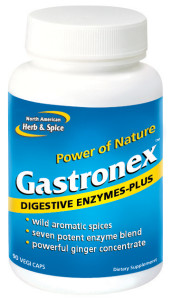Supplementation of enzymes can help achieve optimal health.
With upwards of 60 to 70 million people in the U.S. suffering from digestive issues, it’s no surprise that gut health ranks among consumers’ top health concerns, according to Trisha Sugarek-MacDonald, BS, MS, director of research and development and national educator at Texas-based Bluebonnet Nutrition.
In fact, it is predicted that the digestive health market will witness an upsurge in demand due to aging populations, growing health concerns and rising standard of living.
The National Commission on Digestive Disorders in the U.S. reported in 2009 that 60 to 70 million Americans are affected by digestive diseases each year, at a cost that exceeds $100 billion in direct medical expenses. Further, every year, an additional 105 million visits are made to physicians related to digestive diseases.
“Poor digestive health places a burden not only on an individual but also on the health care system,” Sugarek-MacDonald said. “If prebiotics, probiotics and dietary enzymes can help us reduce even a portion of these costs, they are worth serious consideration.”
In 2010, research firm Marketsand-Markets estimated that the U.S. Digestive Health Ingredients market, which is segmented into three categories (prebiotics, probiotics and enzymes) was valued to be $256.9 million. According to the report, the market is expected to nearly double to $495.3 million in 2015. And while both pre- and probiotics are growing at a double-digit rate, digestive enzymes are experiencing a relatively lower growth rate but are expected to continue on a steady upward projection.

“Probiotics have gained traction in the marketplace and enzymes may be the next wave,” said Lori Ellsworth, vice president of marketing at Florida-based Enzymedica, maker of the Digestive Gold enzyme supplement. “Digestive wellness correlates to overall health.”
The enzyme market has not greatly increased but has the potential to do so through systematic education, according to Judy K. Gray, MS, president Illinois-based North American Herb & Spice maker of Gastronex digestive enzymes-plus supplements.
“The current state of the (enzyme) market is one of vast potential,” Gray said. “Yet, it takes great education. People need to be reminded that it is important to use a high-quality digestive complex for optimal health.”

Gray stressed that according to researchers, at birth, each individual has a store of enzymes—and how long these last depends on how an individual eats, rests, and the lifestyle they lead, with the more stress the greater the loss of enzymes and other nutrients. She also pointed to the fact that an exponential number of people suffer from vague digestive complaints such as gas, bloating, mal-digestion, heartburn, nausea, diarrhea and/or constipation, as well as others and could potentially be aided by the right enzyme choice.
“These people are optimal candidates for enzyme therapy if only they realized it,” said Gray. “They need to be taught about what is the nature of enzyme supplementation, how to distinguish a quality formula, and to realize the critical importance of adding such supplementation for the potential to be realized.” “Proper digestion is critical to overall health,” added Ron Antriasian, vice president business development at Florida-based Life Extension. “The benefits of enzymes, therefore, have become increasingly important, as lack of proper digestion can lead to everything from bloating and headaches to weight gain and long-term disorders.
“Awareness of this issue has resulted in an increase in the demand for enzymes over the past few years,” Antriasian continued. “While growth of this market has not been astronomical, it has been solid, as more and more individuals look to digestive enzymes, probiotics and prebiotics to assist with digestive issues.” While general digestion still dominates as the largest enzyme category in the market, there are a few other emerging trends that appear to be opening the eyes of consumers, including those directed at food sensitivities, according to Mike Smith, vice president of California-based Specialty Enzymes & Biotechnologies.
“The trend in the enzyme category over the last few years has been toward condition-specific products,” Smith said. For example, digestive enzymes may be targeted toward lactose intolerance or gluten sensitivity. “In this same area, meal replacement shakes are a very important category where general enzyme blends can enhance digestion.”
“Recognition of food intolerance is a growing trend with consumers,” said Ryan Sensenbrenner, marketing manager of independent health food stores, at Enzymedica. “Many uncomfortable digestive symptoms may be the result of food intolerances, which are also known as enzyme deficiencies.”
Smith also pointed to the uptake in systemic enzyme products that concentrate on cardiovascular, joint health and inflammation, and offer important health benefits for an aging population.
Digestive Enzymes & Supplements
Enzymes are proteins and are essential to many life processes. By definition, they are biological molecules or proteins that act as catalysts and help complex reactions occur everywhere in life. In the gut, for example, enzymes ensure that food is cut into tiny particles so that it can be converted into energy for the body.
“All biological reactions within human cells depend on enzymes—they are necessary to sustain life,” explained Dr. John Deaton, vice president of technology at Deerland Enzymes in Georgia. “The role of digestive enzymes is to break down food-derived fats, carbohydrates and proteins into smaller substances that our bodies can use.
“Although the body produces its own digestive enzymes, it may not be enough to completely break down cooked or processed foods,” Deaton continued. “During cooking and processing, the natural enzymes present in raw foods are denatured. In addition, our bodies don’t produce the enzyme cellulose at all; this is an enzyme that breaks down the cell wall of plants, releasing the nutrients for our bodies to absorb. Those who follow a vegetarian or vegan diet are likely missing out on key nutrients from the plant-based foods they’re eating, and would most certainly benefit from enzyme supplementation.”
Fortunately, he added, digestive enzyme supplements can provide additional enzymes and help to optimize the digestion process. “The complete release and absorption of food nutrients can result in fewer digestive problems,” Deaton noted.
Enzymes are critical for both digestive and immune health, according to Jacob Teitelbaum, MD, director of the Practitioners Alliance Network, who notes that supplementation is needed for optimal health due to the ongoing destruction of the enzymes present in many of the foods we eat.
“Several decades ago, food processors learned that by destroying the enzymes present in food which ripen the food, shelf life could be prolonged,” Teitelbaum said. “Unfortunately, destroying the enzymes in food has had unintended consequences.”
According to Teitelbaum, the two key things needed to digest food are enzymes and stomach acid. The enzymes present in the food which helps it ripen also helps with food digestion.
“Although our pancreas and salivary glands make enzymes, these were meant to top off what is already present in the food, not to be adequate on their own,” he explained. “Because of this, inadequate enzymes in the food cause poor digestion/indigestion and acid reflux. In addition to an epidemic in indigestion followed by excessive use of acid blockers, incomplete digestion of good, combined with leaky gut, results in the absorption of partially digested proteins which must be attacked by the immune system. This causes exhaustion and dysfunction of immunity, including autoimmunity along the food sensitivities.”
In his book Enzymes: What the Experts Know, author Tom Bohager noted that in many autoimmune cases, enzymes can greatly assist the body and can be aided through the oral intake of proteases, the enzyme knows to break down protein. Unlike other immune support products, he suggested that protease can be taken as a supplement for autoimmune diseases.
He also explained that there are five main things to look for when choosing an enzyme supplement:
• Select a company that specializes in enzymes;
• Check the potency and look for “blended” enzymes;
• Find a product with no fillers;
• Select a company that tests its product to ensure it meets label claims;
• Buy enzymes in capsules, not tablets.
According to the American Gastroenterolgocial Association (AGA) Institute, good digestive health describes a digestive system that has appropriate nutrient absorption, intestinal motility, immune function and a balanced microbiota, or the community of microorganisms in the gut. “Research over the past two decades has revealed that gut health is critical to overall wellness and immunity, and that an unhealthy gut contributes to a wide range of health challenges,” said Deaton. “Many researchers believe that supporting digestive health and restoring the integrity of the gut barrier will be one of the most important goals of health professionals in the 21st century.”
“Enzymes should be viewed as a tool to build whole body health,” said Bret Wyant, vice president of sales for Nebraska-based American Laboratories. “As the population continues to age, but also continues to grow more health conscience, we are seeing people across many demographics turning to supplements to support their healthy lifestyles.”
Retail Outreach
One major obstacle standing in the way of a stronger demand for enzyme supplements and the further emergence of the enzyme market continues to be consumer education. This is where the retailer has the opportunity to educate his customers about the importance of enzymes and enzyme supplementation, and to clear up any confusion surrounding the segments of the market.
One major growth obstacle is a lack of consistent education and reminder of the importance of enzyme necessity to maintaining the thousands of processes that take place in the body moment-by-moment to merely sustain life, according to North American Herb & Spice’s Gray.
“All people need digestive support; all would benefit from supplementation in the form of a reduction of digestive symptoms and also in improved nutrient absorption,” Gray said. “Again, it’s about consistency in getting the message across, including the scientific findings of the benefits of enzyme therapy.”
As prebiotics and probiotics are often looked upon as the perfect complement to enzymes as a means to achieve digestive health, there does appear to be some confusion among consumers regarding the role each plays and whether or not they need to be supplementing individually or together.
“As more and more individuals actively seek nutraceutical remedies as alternatives to pharmaceuticals, the demand for digestive enzymes, probiotics and prebiotics has increased,” said Life Extension’s Antriasian, who stressed that the company provides information on the benefits of enzymes on its website. “These products should be marketed toward those who have not only digestive issues, but any of the additional problems associated with poor digestion, from indigestion and bloating to fatigue and long-term discomfort.”
Then there is the question of animal-based digestive enzymes vs. plant-based enzymes, and which are more effective.
“I find that animal-based digestive enzymes are not effective for digesting food but can help with inflammation,” said Teitelbaum. “Because of this, I recommend only plant-based digestive enzymes. These would be for people with indigestion symptoms such as solar plexus burning and acid reflux. For those symptoms lower down such as around the belly button, dysbiosis is a more likely culprit and probiotics can be very helpful.”
Another important message for retailers to convey to those customers seeking digestive relief from enzyme supplements is in the way enzyme efficacy is measured, according to Deaton.
“Unlike traditional supplements that are measured by weight, enzymes are measured by their activity, and often in varying units,” Deaton said. “It’s important for the consumer to know that for enzyme-based supplements, more milligrams don’t necessarily equal increased potency.”
One of the challenges is helping retailers understand how enzymes are different from other supplements, added Smith. “For example, vitamins and minerals all have a daily value that is based on weight. Even supplements that lack a daily value are formulated by weight. With enzymes, it is their activity rather than weight that is important.”
So just how do retailers go about educating their customers on enzymes while making their store inviting to those who want to learn more about what enzymes can do for their overall health and wellbeing?
According to Enzymedica’s Sensenbrenner, some independent natural products stores, like Marietta Health Foods in Marietta, GA, may benefit from branding themselves as digestive care or food intolerance centers.
“This is a growing trend that shows retailers are recognizing the public need for digestive support, and using that as a key marketing tool to differentiate themselves from their competition while providing a unique shopping experience compared to that found online or in some national chains,” Sensenbrenner said.
Sugarek-MacDonald recommended renovating a store’s digestive health department by making it “attractive, interactive and informative for consumers—no matter what the age.” She further suggests cross-merchandising “digestive healthy” products on an end cap by combining dietary supplements and packaged foods for digestive health.
She also recommended selecting wide-ranging and appropriate targeted supplements for digestive health and dividing the digestive health product section into subcategories. Finally, Sugarek-MacDonald cautioned against product redundancy and instead suggested focusing on one particular digestive health subcategory, or picking three popular items across categories and rotating them on a monthly basis.
Scott Ravech, CEO, Deerland Enzymes, said that supplement consumers are characteristically very diligent in their research to understand different supplements and how the ingredients work in the body.
“Therefore, providing educational materials should be a continued focus of the retailer,” he stressed. “We see that more forward-thinking manufacturers and retailers are making great efforts to educate consumers through websites, retail displays, and even in-store advocates.” VR
For More Information:
American Laboratories, (402) 339-2494
Bluebonnet Nutrition Corp., (800) 580-8866
Deerland Enzymes, (800) 697-8179
Enzymedica, (888) 918-1118
Life Extension, (866) 585-1435
North American Herb & Spice, (800) 243-5242
Specialty Enzymes & Biotechnologies, (909) 613-1660




![[Sponsored Video] Special Report: Bergamonte®, the Untold Story](https://vitaminretailer.com/wp-content/uploads/2023/06/sponsored-video-special-report-b-300x169-1707947265.jpg)








